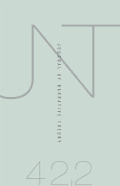
JNT-JOURNAL OF NARRATIVE THEORY
Scope & Guideline
Connecting Cultures Through the Power of Story
Introduction
Aims and Scopes
- Interdisciplinary Approaches to Narrative:
The journal promotes interdisciplinary research that intersects narrative theory with other fields such as film studies, cultural studies, and cognitive science, fostering a holistic understanding of narrative. - Diverse Narrative Forms and Genres:
It encompasses a variety of narrative forms, including literary texts, film, and digital storytelling, highlighting how different genres influence narrative construction and reception. - Cultural and Historical Contextualization:
The journal focuses on the cultural and historical contexts that shape narratives, examining how societal issues, identities, and historical moments are represented and interpreted in storytelling. - Narrative Techniques and Structures:
A significant emphasis is placed on the analysis of narrative techniques, such as unreliable narration, metafiction, and hybrid genres, exploring their implications for meaning-making and reader engagement. - Ethics and Politics of Narrative:
The journal investigates the ethical dimensions of narrative, including issues of representation, voice, and responsibility in storytelling, particularly in relation to marginalized communities.
Trending and Emerging
- Narrative and Identity:
A growing interest in the intersection of narrative and identity, including explorations of gender, race, and sexuality, is evident in recent publications, reflecting broader societal conversations about representation and personal narratives. - Narrative as a Tool for Climate Discourse:
Emerging themes around climate narratives and storytelling are on the rise, indicating a recognition of the role narrative plays in shaping public understanding and engagement with climate issues and environmental crises. - Digital and Interactive Narratives:
There is an increasing focus on digital narratives and interactive storytelling, showcasing how technology influences narrative structures and audience participation, which is crucial in our digital age. - The Role of Emotion in Narratives:
Recent articles highlight the importance of emotional engagement in narratives, examining how affective responses shape reader and viewer experiences, and how narratives can evoke empathy and connection. - Narrative Theory and Cognitive Science:
A trend towards integrating cognitive science with narrative theory is emerging, exploring how narratives influence cognition, memory, and perception, thereby enhancing our understanding of narrative impact.
Declining or Waning
- Traditional Narratology:
There is a noticeable decline in papers focusing on classical narratological theories, such as those strictly adhering to structuralist frameworks, as newer methodologies emerge that prioritize fluid and hybrid narrative forms. - Exclusive Focus on Literary Texts:
The journal's emphasis has shifted away from solely literary analysis, with fewer articles dedicated strictly to traditional literature, as it increasingly embraces a broader range of narrative mediums, including film and digital narratives. - Static Genre Analysis:
Research that categorizes narratives within fixed genre conventions seems to be less frequent, as contemporary studies favor more dynamic approaches that explore genre blending and the fluidity of narrative boundaries. - Historical Narratives in Isolation:
There is a reduction in the analysis of historical narratives in isolation, with a move towards examining narratives in relation to contemporary issues and cultural contexts rather than focusing solely on historical accuracy or representation.
Similar Journals
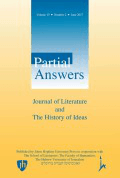
Partial Answers-Journal of Literature and the History of Ideas
Challenging Perspectives in Literature and PhilosophyPartial Answers - Journal of Literature and the History of Ideas, published by the esteemed Johns Hopkins University Press, is a vital academic resource for scholars interested in the dynamic intersections of literature, philosophy, and cultural studies. With an established track record since its inception in 2003, this journal fosters rigorous dialogue and exploration across disciplines, offering a comprehensive platform for innovative research and critical thought. Highlighted by its 2023 Scopus rankings, it holds positions within the Q2 and Q3 quartiles, indicating a significant impact in its respective fields—specifically in Literature and Literary Theory, and Cultural Studies. Readers can expect cutting-edge articles that challenge conventional wisdom and probe the historical contexts of literary works. Although the journal is not Open Access, it remains committed to the dissemination of scholarly knowledge, making it a cornerstone for researchers, professionals, and students seeking to deepen their understanding of literature's role in shaping ideas. With its diverse contributions and thematic depth, Partial Answers is essential for anyone engaged in the nuanced study of literary narratives and philosophical inquiries.
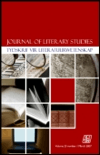
Journal of Literary Studies
Connecting scholars through critical literary dialogue.Journal of Literary Studies, published by UNISA PRESS, is a premier open access journal dedicated to advancing the field of literature and literary theory. With its ISSN 0256-4718 and E-ISSN 1753-5387, the journal has established itself as a leading platform for innovative research since its inception in 1985, with a notable convergence period running through to 2024. Recognized in the Q1 quartile of literature and literary theory, the journal ranks impressively at #236 out of 1106 in its category according to Scopus, highlighting its impact in the arts and humanities with a percentile rank of 78th. The journal's open access model, adopted in 2022, reflects its commitment to accessibility and dissemination of knowledge globally, making it an essential resource for researchers, academics, and students alike. With an editorial focus on interdisciplinary approaches and contemporary critical discourse, the Journal of Literary Studies serves as a vital vessel for the exchange of ideas and scholarly dialogue in the intricate landscape of literary studies.
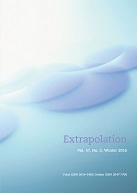
EXTRAPOLATION
Connecting Ideas Through Rigorous ResearchEXTRAPOLATION, published by Liverpool University Press, is a leading academic journal that occupies a vital space in the fields of Cultural Studies and Literature and Literary Theory. With an ISSN of 0014-5483 and an E-ISSN of 2047-7708, the journal has established a robust scholarly reputation, as evidenced by its Q1 ranking in Literature and Literary Theory and Q2 ranking in Cultural Studies for 2023. The journal serves as a platform for in-depth research and critical discourse, ranging from contemporary literary analyses to interdisciplinary cultural investigations. By embracing an array of theoretical perspectives, EXTRAPOLATION offers readers access to cutting-edge scholarship and fosters a dynamic exchange of ideas, making it an indispensable resource for researchers, educators, and students alike. The journal has been converging valuable contributions from 2011 to 2024, solidifying its importance in the academic landscape. Although access is not open, the journal's exceptional standing, indicated by a rank of #163 in Literature and Literary Theory (85th percentile) and #543 in Cultural Studies (58th percentile) within Scopus rankings, underscores its relevance and impact.
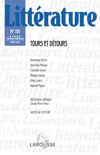
LITTERATURE
Bridging Scholarship and Society Through Literature.LITTERATURE is a distinguished academic journal published by LAROUSSE, dedicated to the exploration and critical discourse of literary studies. Based in France, this journal, with ISSN 0047-4800 and E-ISSN 1958-5926, serves as a vital platform for scholars, students, and professionals interested in both contemporary and historical literary theory. Despite its current categorization in the Q4 quartile of literature and literary theory for 2023, LITTERATURE aspires to elevate discussions within the field, providing a peer-reviewed environment for innovative research and theoretical exploration. The journal covers an extensive range of topics, including literary criticism, narrative theory, and cultural studies, ensuring it remains relevant in an evolving academic landscape. With an unwavering commitment to fostering scholarly communication, LITTERATURE invites contributions that challenge conventional perspectives and push the boundaries of literary analysis, aiming to bridge the gap between academic scholarship and broader societal narratives.

RLC-REVUE DE LITTERATURE COMPAREE
Exploring the Depths of Literary DiversityRLC-REVUE DE LITTERATURE COMPAREE, published by DIDIER-ERUDITION, is a prominent French journal focused on comparative literature and literary theory, holding an ISSN of 0035-1466. Established in 2001, the journal aims to foster scholarly exchange and critical analysis in the field of literature, examining texts across cultures and disciplines. With its current categorization in the Q4 quartile for literature and literary theory as of 2023 and holding a Scopus rank of #880 out of 1106, RLC remains an accessible resource for researchers, professionals, and students alike. While it operates under a traditional access model, it continuously strives to contribute to the academic discourse within its scope, enhancing the understanding of literary complexities and intercultural exchanges. Based in the heart of Paris, at 6 RUE DE LA SORBONNE, the journal invites contributions that explore innovative perspectives and methodologies in literary studies through its ongoing commitment to scholarly excellence.
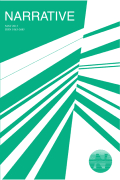
NARRATIVE
Illuminating the Intersection of Story and SocietyNARRATIVE is a distinguished academic journal published by Ohio State University Press, focusing on the intricate dimensions of literature and literary theory. Established in 2002, this journal has quickly risen to prominence, currently ranking first quartile (Q1) in its field according to 2023 metrics, and securing an impressive percentile of 94th among 1106 journals in Arts and Humanities. With its ISSN 1063-3685 and E-ISSN 1538-974X, NARRATIVE is committed to exploring the narrative structures and processes that shape our understanding of both literature and broader cultural phenomena. Although it does not offer open access, NARRATIVE proudly contributes to academic discourse by publishing articles that challenge, inform, and inspire scholars, professionals, and students worldwide. The journal continues to be an essential platform for innovative research and critical analysis, fostering dialogue at the intersection of storytelling, identity, and societal context.

Literature Compass
Navigating the Depths of Literary DiscourseLiterature Compass, published by WILEY, is an esteemed journal in the field of Literature and Cultural Studies, reflecting a robust commitment to advancing scholarly discourse since its inception in 2004. With an impressive Q1 ranking in Literature and Literary Theory and a Q2 ranking in Cultural Studies as of 2023, the journal stands out as a critical resource for researchers, professionals, and students alike, offering insights into contemporary literary analysis and cultural critique. While not operating as an open access journal, it provides a wealth of peer-reviewed articles that delve into the complexities of literature and its societal implications. The journal’s unique aim is to bridge diverse literary topics, facilitating a holistic understanding of narrative forms and their cultural contexts. As part of a prestigious academic tradition, Literature Compass is published from the United Kingdom and serves as a vital platform for intellectual exchange in an increasingly interconnected world.

Frontiers of Narrative Studies
Pioneering New Frontiers in Narrative TheoryFrontiers of Narrative Studies, published by Walter de Gruyter GmbH, is an essential journal dedicated to exploring the multifaceted dimensions of narrative theory and its applications across various disciplines. With its ISSN 2509-4882 and E-ISSN 2509-4890, this journal serves as a pivotal platform for researchers, professionals, and students interested in the intricate relationships between narrative and culture, literature, and digital media. The journal places a strong emphasis on innovative methodologies and interdisciplinary approaches, making it a vital resource for those seeking to advance their understanding of narrative structures and their significance in contemporary society. Additionally, Frontiers of Narrative Studies encourages open discussions and critical analyses, facilitating a rich dialogue among scholars from various fields. With its commitment to quality and scholarly rigor, this journal is positioned to impact both academic discourse and practical applications in the study of narrative.

CONFLUENCIA-REVISTA HISPANICA DE CULTURA Y LITERATURA
Showcasing the Rich Tapestry of Hispanic ArtsCONFLUENCIA-REVISTA HISPANICA DE CULTURA Y LITERATURA, published by Colorado State University, is a pivotal academic journal that has been contributing to the fields of Cultural Studies, Literature and Literary Theory, and Visual Arts and Performing Arts since 2002. With its ISSN 0888-6091 and E-ISSN 2328-6962, the journal aims to foster interdisciplinary dialogue and showcase innovative research that bridges literary analysis with cultural phenomena. As highlighted by its impressive rankings, the journal holds a Q3 category in Cultural Studies and Q2 in both Literature and Literary Theory and Visual Arts and Performing Arts, reflecting its significance and the quality of its contributions. Although it currently does not offer open access, the journal remains a respected platform for scholars, providing rich content that engages and inspires further research in the humanities. As it converges years from 2002 to 2024, CONFLUENCIA stands at the forefront of exploring the complexities of Hispanic culture and literature, making it an indispensable resource for researchers, professionals, and students alike.
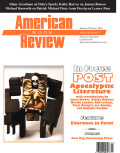
AMERICAN BOOK REVIEW
Cultivating a Platform for Diverse Literary NarrativesAMERICAN BOOK REVIEW is a pivotal journal in the fields of Cultural Studies and Literature and Literary Theory, published by the University of Houston, Victoria - Art & Science. Esteemed for its critical engagement with contemporary literary discourses, the journal provides a platform for scholars and practitioners to explore diverse narratives and theoretical frameworks that shape our understanding of literature. With an ISSN of 0149-9408 and E-ISSN 2153-4578, it serves as an essential resource for those seeking to deepen their insights into the intersection of literature and culture. Although positioned in the Q4 category for both Cultural Studies and Literature in 2023, the journal emphasizes the importance of inclusivity in academic dialogue, aiming to elevate lesser-heard voices in literary critique. Despite its challenging Scopus ranking, its commitment to fostering innovative scholarship makes it a noteworthy asset for researchers, professionals, and students alike. The journal's address is located at 3007 N Ben Wilson, Victoria, TX 77901, United States.